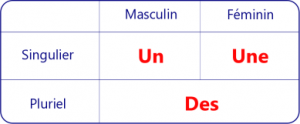Difference between revisions of "Language/French/Grammar/Indefinite-article"
Jump to navigation
Jump to search
m (Quick edit) |
m (Quick edit) |
||
| Line 2: | Line 2: | ||
[[File:indefinite-article-in-french-polyglotclub.png|thumb]] | [[File:indefinite-article-in-french-polyglotclub.png|thumb]] | ||
<div | <div class="pg_page_title">Indefinite article in French</div> | ||
__TOC__ | __TOC__ | ||
== French Articles == | == French Articles == | ||
| Line 45: | Line 45: | ||
In French, nouns are almost always preceded by an article or a determiner. This indicates the gender of the noun (masculine or feminine) and its number (singular or plural). | In French, nouns are almost always preceded by an article or a determiner. This indicates the gender of the noun (masculine or feminine) and its number (singular or plural). | ||
We use the indefinite articles (articles indéfinis) in the following cases: | We use the indefinite articles (articles indéfinis) in the following cases: | ||
| Line 84: | Line 83: | ||
<youtube>https://www.youtube.com/watch?v=DSiG8mYiwkI</youtube> | <youtube>https://www.youtube.com/watch?v=DSiG8mYiwkI</youtube> | ||
== | ==Other Lessons== | ||
* [[Language/French/Grammar/Demonstrative-pronouns-with-—ci-and-—là|Demonstrative pronouns with —ci and —là]] | * [[Language/French/Grammar/Demonstrative-pronouns-with-—ci-and-—là|Demonstrative pronouns with —ci and —là]] | ||
* [[Language/French/Grammar/Compound-adjectives-involving-demi—,-nu—-and-mi—|Compound adjectives involving demi—, nu— and mi—]] | * [[Language/French/Grammar/Compound-adjectives-involving-demi—,-nu—-and-mi—|Compound adjectives involving demi—, nu— and mi—]] | ||
| Line 100: | Line 99: | ||
* [[Language/French/Grammar/Nouns-with-irregular-plurals|Nouns with irregular plurals]] | * [[Language/French/Grammar/Nouns-with-irregular-plurals|Nouns with irregular plurals]] | ||
* [[Language/French/Grammar/Singular-or-plural-when-a-number-of-individuals-have-one-item-each|Singular or plural when a number of individuals have one item each]] | * [[Language/French/Grammar/Singular-or-plural-when-a-number-of-individuals-have-one-item-each|Singular or plural when a number of individuals have one item each]] | ||
<span links></span> | |||
Latest revision as of 14:01, 27 March 2023
Indefinite article in French
French Articles[edit | edit source]
French has 3 kinds of articles:
- Definite articles
- Indefinite articles
- Partitive articles
The table below summarizes the different forms:
| French Articles | |||
|---|---|---|---|
| Definite article | Indefinite article | Partitive | |
| masculine | le | un | du |
| feminine | la | une | de la |
| in front of a vowel | l' | un/une | de l' |
| plural | les | des | des |
Indefinite Article : Rule & Examples[edit | edit source]
In French, nouns are almost always preceded by an article or a determiner. This indicates the gender of the noun (masculine or feminine) and its number (singular or plural).
We use the indefinite articles (articles indéfinis) in the following cases:
To talk about something non-specific:[edit | edit source]
- Céline est une copine de Noémie. (one of many)
Céline is a friend of Noémie. (one of many)
To mention something for the first time in a text:[edit | edit source]
- Jean a acheté une moto.
Jean bought a motorbike.
In can be translated by “a” or “an” in English.
Video - French Indefinite Article / How to say “a” or “an” in French[edit | edit source]
Learn how to say “a” or “an” in French
- Similar lessons : Definite article & Indefinite article
- More on this subject: Typical use of the indefinite article
Videos[edit | edit source]
French Definite and Indefinite Articles - YouTube[edit | edit source]
Learn French Indefinite Articles for Beginners - YouTube[edit | edit source]
French indefinite Article (French Essentials Lesson 8) - YouTube[edit | edit source]
FRENCH ARTICLES - DEFINITE INDEFINITE & PARTITIVE ...[edit | edit source]
Un Une Des - French Indefinite Articles // French Grammar Course ...[edit | edit source]
Other Lessons[edit | edit source]
- Demonstrative pronouns with —ci and —là
- Compound adjectives involving demi—, nu— and mi—
- Pronominal verbs and body parts
- Gender
- Invariable adjectives
- An adjective agreeing with nouns linked by de
- Location of adverbs modifying verb phrases
- Indefinite and negative noun phrases with adjective complements
- Use of en
- Adverbs ending in —ment derived from the masculine form of an adjective
- An adjective agreeing with nouns linked by et, ou or ni
- Direct object quantifiers and « en »
- Use of il, ce, cela and ça as impersonal pronouns
- Nouns with irregular plurals
- Singular or plural when a number of individuals have one item each

